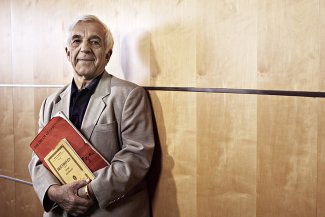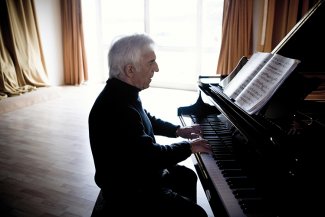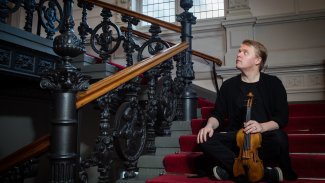Vladimir Ashkenazy

Conductor Laureate: Philharmonia Orchestra
Conductor Laureate: NHK Symphony Orchestra
Conductor Laureate: Iceland Symphony Orchestra
Conductor Laureate: Sydney Symphony Orchestra
Principal Guest Conductor: Orchestra della Svizzera Italiana
One of the few artists to combine a successful career as a pianist and conductor, Russian-born Vladimir Ashkenazy inherited his musical gift from both sides of his family; his father David Ashkenazy was a professional light music pianist and his mother Evstolia (née Plotnova) was daughter of a chorus master in the Russian Orthodox church. Ashkenazy first came to prominence on the world stage in the 1955 Chopin Competition in Warsaw and as first prize-winner of the Queen Elisabeth Competition in Brussels in 1956. Since then he has built an extraordinary career, not only as one of the most outstanding pianists of the 20th century, but as an artist whose creative life encompasses a vast range of activities and continues to offer inspiration to music-lovers across the world.
Conducting has formed the larger part of Ashkenazy’s activities for more than 35 years. He continues his longstanding relationship with the Philharmonia Orchestra, who appointed him Conductor Laureate in 2000. In addition to his performances with the orchestra in London and around the UK each season, Vladimir Ashkenazy joins the Philharmonia Orchestra on countless tours worldwide. In the past, Ashkenazy and the Philharmonia have developed landmark projects such as Voices of Revolution: Russia 1917 at Southbank Centre last season, Prokofiev and Shostakovich Under Stalin (a project which he also took to Cologne, New York, Vienna and Moscow) and Rachmaninoff Revisited (which was also presented in Paris).
Show More
In 2019, Vladimir Ashkenazy was named as the very first Conductor Laureate of Sydney Symphony Orchestra. This appointment has been made in recognition of his 50 year association with the Orchestra which began in 1969 and is an honour never before bestowed on any previous Sydney Symphony conductor. One of the most revered figures in classical music, the legendary pianist and veteran conductor accepts this position having entered his ninth decade. The young-at-heart musician who has a most impressive array of awards and recognitions to his name, as well as a vast discography both as a pianist and a conductor, Ashkenazy enjoys a career rich in achievement but remains, despite the prestige, a musician of the greatest dignity and unparalleled spiritual height. He has continued, for more than 60 years, to thrill audiences around the world and to shape profoundly many generations of musicians, maintaining an incredible level of trust and respect from them. A person of great warmth, humility and generosity, he has contributed immensely to the underprivileged and to humanity in general, reaching well beyond his contribution as a musician.
Ashkenazy is also Conductor Laureate of both the Iceland and NHK Symphony orchestras and Principal Guest Conductor of the Orchestra della Svizzera Italiana. Previously he has held posts as Music Director of the EUYO, Chief Conductor of the Czech Philharmonic Orchestra and Music Director of NHK Symphony Orchestra. He maintains strong links with other major orchestras including The Cleveland Orchestra (where he was formerly Principal Guest Conductor) and Deutsches Symphonie-Orchester Berlin (Chief Conductor and Music Director 1988 – 96). He regularly makes guest appearances with many other major orchestras around the world.
Ashkenazy maintains his devotion to the piano, these days mostly in the recording studio where he continues to build his extraordinarily comprehensive recording catalogue. This includes the Grammy award-winning album of Shostakovich’s Preludes and Fugues, Rautavaara’s Piano Concerto No.3 (a work which he commissioned), Bach’s Wohltemperierte Klavier, Rachmaninov’s Transcriptions and Beethoven’s Diabelli Variations, ‘Ashkenazy: 50 Years on Decca’ — a 50-CD box-set celebrating his long-standing relationship with the label, a milestone collection of Ashkenazy’s vast catalogue of Rachmaninov’s piano music, which also includes all of his recordings as a conductor of the composer’s orchestral music. 2017 saw the release of his latest album, Bach’s French Suites, and two new box sets — Vladimir Ashkenazy’s Complete Concerto recordings and a personal selection of solo and chamber works.
Beyond his performing schedule, Vladimir Ashkenazy has also been involved in many television projects, inspired by his passionate drive to ensure that serious music retains a platform in the mainstream media and is available to as broad an audience as possible. He has collaborated extensively with legendary documentary-maker Christopher Nupen, and has been involved in programmes such as Music After Mao (filmed in Shanghai in 1979), and Ashkenazy in Moscow, which followed his first return to Russia since leaving the USSR in the 1960s, and educational programmes with NHK TV including the 1999 Superteachers, working with inner-city London school children, and in 2003 – 4 a documentary based around his ‘Prokofiev and Shostakovich Under Stalin’ project.
Contacts
Jasper Parrott Executive Chairman HP Group & Associated Companies Federico Hernandez General Manager HarrisonParrott Madrid & Latin American Business Katya Walker-Arnott Artist & Project Manager
Federico Hernandez General Manager HarrisonParrott Madrid & Latin American Business Katya Walker-Arnott Artist & Project Manager
Katya Walker-Arnott Artist & Project Manager
“The Cleveland Orchestra joined two old friends — guest conductor Vladimir Ashkenazy and pianist Emanuel Ax […] Ashkenazy set the first movement up with a true pianissimo and a leisurely, spacious tempo that gave Ax plenty of room to express himself […] Communication between soloist, conductor, and orchestra was mesmerizing. Ashkenazy and the Orchestra’s strings gave those outer movements an ebullient performance, and brought out Elgar’s elegiac side in the expressive Larghetto. Sunday’s program ended in an explosion of orchestral color with Elgar’s Enigma Variations. What fun it would have been to be one of the composer’s friends and find your personality captured in these thumbnail sketches. The sonorous opening leads to fourteen witty, brilliant, sometimes bittersweet musical portraits, including one identified only as *** (an enigma within an enigma). Canny pacing from Ashkenazy and playing of uncommon brilliance and transparency from The Cleveland Orchestra and its many soloists made this a performance to cherish.”
“The orchestra Friday evening welcomed Ashkenazy like a favorite uncle, treating their guest, a regular since 1968 but absent since 2010, to two uniformly stellar performances of works by Elgar, and supported Ax with affection in Beethoven’s Piano Concerto No.1. After the first work on the program, one can only ask: where has Elgar’s Serenade for Strings been since 1996? Maybe Ashkenazy, the one who performed it then as well, is the key, the one uniquely capable of unlocking the work’s elegance and supreme tenderness of feeling. Maybe he’s the only one who can elicit from Cleveland’s strings such clarity and tonal sheen. Different, much more famous work by Elgar after intermission. Same electrifying effect by Ashkenazy. You would think, after so many performances over the years, that the Cleveland Orchestra couldn’t get better in the “Enigma Variations,” that within those 14 musical portraits, there wouldn’t be anything left to reveal. You would be wrong. With Ashkenazy at the helm Friday, the orchestra made the popular score sound almost new. With him, the piece was again the virtuoso showcase it really is, the treasure-trove of melody and brilliant orchestration.”
“There is great intensity to Eisenstein’s images of terrifying violence and the Shostakovich arrangement underlines this. […] Ashkenazy drew muscular and detailed playing from the Philharmonia Orchestra. He also gave the music light and shade.”



























